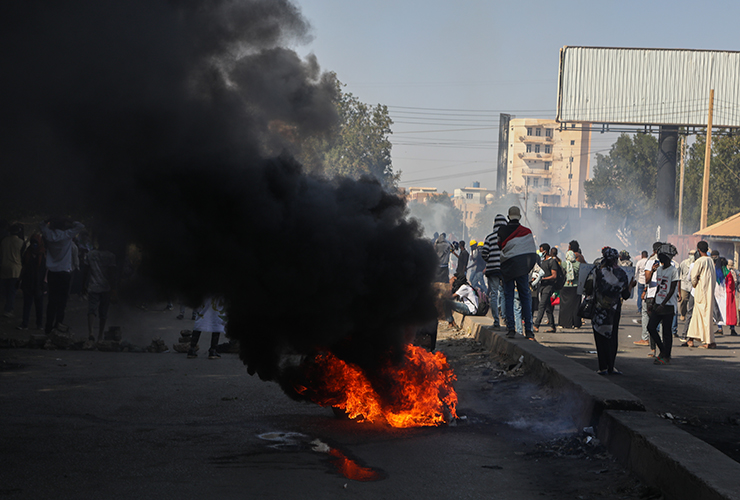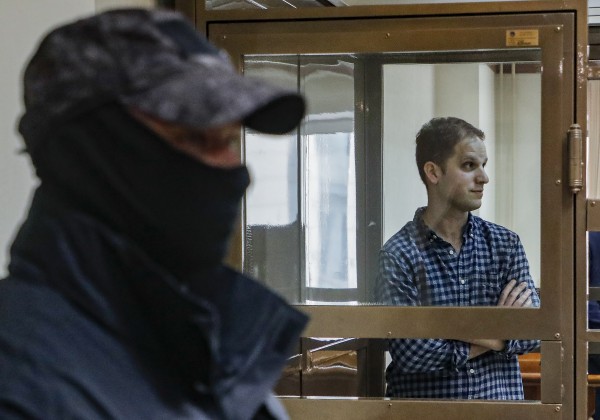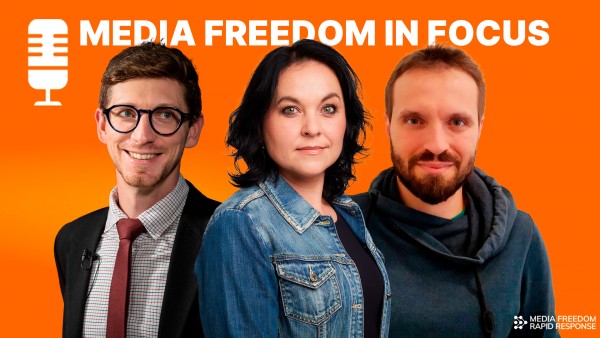Ali Farsab was shot at and beaten by Sudanese security forces on November 19 while covering protests in Sudan following the October military coup. Even with a slow physical recovery, he is ready to continue reporting on increasingly violent, and fatal, protests and won’t let his own trauma stop him.
“The incident that I faced served as a warning to my fellow journalists to take caution while covering the protest processions”, Farsab, a journalist for Al-Tayar, told IPI on January 25. After security forces beat and shot at him, with the bullet grazing his head, he was detained for over two days. He was just one of the many journalists who have been attacked following the coup.
The October 25 military coup in Sudan came nearly two years after the fall of Omar al-Bashir’s National Congress party from government in 2019, which brought an end to 30 years of authoritarian rule. However, the civilian-military power-sharing government, which was the central focus of the attempted democratic transition, fell apart when the civilian and military factions split over deteriorating economic conditions.
Thousands of Sudanese stormed the streets following the military takeover of the country. After being overthrown, civilian Prime Minister Abdalla Hamdok was briefly reinstated in November, signing a deal with Sudanese military General Abdel Fattah al-Burhan to transition the government and calm protestors. However, the plan failed and did not quell the momentum of the pro-democracy movement – many of the protestors don’t trust the military to govern at all.
Press freedom always under attack
Journalists who cover the protests put themselves at extreme, and life-threatening, risk. Since the coup, security forces have raided multiple newsrooms, revoked the broadcast license of Al Jazeera Mubasher, arrested the Al Jazeera bureau chief, and arrested journalists at Alaraby’s Khartoum newsroom. The government also disrupted the internet and other telecommunications services, cutting the steady flow of news to the public.
Moutaz Al Qaissia, the head of foreign bureaus at Alabary TV, told IPI that his four staff members who were detained – Wael Mohammed Alhassan, Mazen Onou, Abu Baker Ali and Islam Saleh – on Jan. 13 and later released now fear government retribution. Sudanese officials beat them at several points during their detention and damaged their equipment, the broadcaster said.
“Of course, the situation had its toll on them”, Al Qaissia told IPI. “Now, it is difficult for them to cover the demonstrations and any story in Khartoum.” He said the journalists were unable to report outside the office for a few days following the incident.
The Sudanese government suppressed media freedom before this, too. During President Omar al-Bashir’s 30-year rule, Sudan was known as one of the most dangerous places for journalists. Bashir’s government engaged in harsh censorship, to the extent where officials were present in newsrooms. Officials also detained journalists, shut down newsrooms, fined publishers, and restricted topics outlets could report on.
Even after Bashir was ousted in April 2019, after months of popular demonstrations, the transitional government still cracked down on journalists. The Transitional Military Council shut down the Al Jazeera bureau in Khartoum in May 2019 and suspended the operations of four media outlets in February 2020. Officials also harassed and arrested dozens of journalists.
“These types of incidents do not help any democratic transition in Sudan and obstruct the essence of the work of journalists which is to cover events as they happen, truthfully and objectively”, Al Qaissa said, referring to the incidents that occurred following both the April 2019 ouster and the October 2021 coup.
Journalists continue to risk their lives to report on protests
Al-Burhan, who is now the de facto head of state, claimed in December 2021 that he is committed to building all the institutions of a transitional government for democracy and will hold free and fair elections in July 2023. Many are skeptical of his pledge, not least because the military has killed a reported 76 pro-democracy protestors.
Mohammed El-Agraa, a reporter for the Al-Hadath newspaper, said he is more fearful of the government now than he was during the Bashir era.
“Journalists cannot wear distinctive work clothes because that makes them vulnerable to direct targeting by bullets, rubber bullets and tear gas canisters by the security forces”, El-Agraa told IPI. “At many police checkpoints following protests, journalists avoid showing their journalistic identity because this directly exposes them to violence by the authorities.”
Mekki Elmograbi has been a journalist for over 27 years. He said conditions for journalists to do their work haven’t changed since Bashir was overthrown, and that the disruption of the internet following the recent coup completely isolated journalists from gathering or developing news reports.
However, he is convinced journalists will never stop reporting on the protests despite the extreme risk of reporting on the ground.
“In Sudan, the journalists, they don’t abandon their jobs at all because we lived in this situation”, Elmograbi said. “It is not our first time to suffer from this situation.”
Even if they don’t abandon their jobs, it is a cause for anger and concern that journalists in Sudan will suffer from trauma for years to come. Farsab said he senses caution from his colleagues, as his incident served as a warning for what could happen to them. Other arrests in the past few weeks compound journalists’ exercise of caution after his own detention, Farsab said.
“The situation of press freedom in Sudan is at stake, and its deterioration has escalated to far stages”, Farsab said. “But journalists will not stop covering, they will continue to cover the protests, because that’s what they do.”



